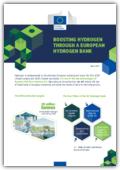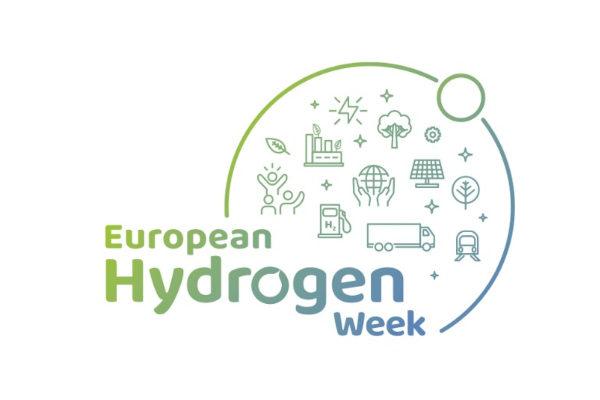How the EU supports hydrogen research
Hydrogen can act as an energy carrier to transport and store large quantities of renewable-sourced energy over long periods of time or act directly as a fuel, especially for industry or transport. For this reason, it has an important role to play in the clean energy transition.
Renewable – also called ‘green’ or ‘clean’ - hydrogen is becoming more and more important for Europe to achieve its goals of fighting climate change, reducing greenhouse gas emissions, and securing strategic energy independence when hydrogen is produced domestically.
Years of supporting research and innovation has put the EU in the global lead for key hydrogen technologies, covering the complete value chain, from production, storage, and distribution to a range of final uses in all sectors of the economy.
Hydrogen now plays an important role in various EU policies:
- in the European Green Deal and REPowerEU, renewable hydrogen supports the transition to secure, affordable and renewable energy technologies, as well as the development of hydrogen valleys
- under the Green Deal’s Net-Zero Industry Act, hydrogen fuel cells are one of the key technologies
- linked to this is the creation of a European Hydrogen Bank to unlock private investments and create a renewable hydrogen market
- the Green Deal’s Critical Raw Materials Act will help ensure that the right materials will be available for electrolysers and renewable energy sources, both needed to create renewable hydrogen in a secure and clean manner
- on international level the Clean Hydrogen mission of Mission Innovation is working towards the same goals, reducing the cost of renewable hydrogen and developing hydrogen valleys worldwide
All these actions support the uptake of hydrogen in Europe, allowing for the supply of renewable energy for households, industry, and transport and making our lives and environment cleaner and healthier. The necessary skills to support this transition are addressed in ERASMUS + and the European Hydrogen Academy amongst others.
Horizon Europe
The Clean Hydrogen Partnership spearheads the development of advanced technologies to drive down the cost and scale-up the volumes of renewable hydrogen production. The European Hydrogen Bank supports the uptake of renewable hydrogen and the creation of an emerging European hydrogen market by efficiently connecting supply to demand and addressing the initial investment challenges.
Under the Green Deal call of Horizon 2020, several topics – directly or indirectly – dealt with hydrogen. One of the projects resulting from this call is the (ongoing) project GreenHyScale.
There are synergies with various other partnerships that support directly or indirectly the uptake of hydrogen technologies and applications, such as:
- The Clean Aviation partnership
- The 2Zero Partnership (Towards Zero-emission Road Transport)
- The Zero-Emission Waterborne partnership (Zero-emission shipping)
- The Clean Energy Transition Partnership
- The EU Clean Steel Partnership
- The EU’s Rail Partnership
- The Process for Planet partnership (Circularity and climate neutrality in the processing industry)
Other synergies include:
- The European Hydrogen Alliance
- The European Innovation Fund
- The Cohesion Fund (for hydrogen valleys)
- The Connecting Europe Facility (CEF)
- The Trans-European Network for Energy (TEN-E - for hydrogen infrastructures)
Moreover, the European Innovation Council, which was established under the EU Horizon Europe programme, aims at developing novel processes and technologies to produce renewable hydrogen through one of its Pathfinder Challenges.
EU initiatives
Net Zero Industry Act
The Net-Zero Industry Act is an initiative stemming from the Green Deal Industrial Plan which aims to scale up the manufacturing of clean technologies in the EU. It supports in particular strategic net-zero technologies that are commercially available and have a good potential for rapid-scale up. Electrolysers and hydrogen fuel cells are such strategic technologies.
Critical Raw Materials Act
With the European Raw Materials Act, the EU aims to ensure secure and sustainable supply of critical raw materials for Europe’s industry and significantly lower the EU’s dependency on imports from single country suppliers. Renewable hydrogen relies on renewable energy for its production, leading to a high demand for critical raw materials. One of the pillars of this act is promoting a more sustainable and circular critical raw materials economy.
REPowerEU
On 8 March 2022, the Commission announced REPowerEU, a plan to phase out our dependence on fossil fuels from Russia well before 2030. As one of its key actions, it foresees accelerating the use of renewable hydrogen as a replacement of fossil gas.
Research and innovation is key to enable boosting of the domestic production of renewable hydrogen, for example by increasing electrolyser capacity in the EU by 6 GW in 2025 and 40 GW by 2030.
The REPowerEU objectives foresee the use of 20 million tonnes of renewable hydrogen per year in the EU by 2030, with half of this produced domestically and the other half imported.
Skills initiatives
The Commission recently granted approximately €3.8 million under ERASMUS+ for a long-term project between industry and education partners called GreenSkills4H2, to develop advanced skills for the hydrogen economy.
The goal of this project is to assess which are the main and most urgent critical jobs, skills and training needs, and to issue training/education materials to be used across EU training and education institutes.
Another initiative is the European Hydrogen Academy funded by the Clean Hydrogen partnership (call 2023, with an EU contribution of €3 million).
The main goals are to train pupils in primary and secondary education, as well as qualified engineers in higher education, setting a target for 5000 graduates in the mid-term. Another objective is to contribute with up to 105 universities and/or educative centres in the mid-term. It will be integrated within the future global hydrogen academy foreseen by the Net Zero Industry Act.
SET Plan and ERA pilot on Green Hydrogen
European Research Area (ERA), 25 EU countries and 5 countries associated to Horizon Europe, in close coordination with the European Commission, launched a pilot project to work together on Green Hydrogen.
In March 2022, the ERA pilot on Green Hydrogen published its Strategic Research and Innovation Agenda (SRIA), which identifies common research and innovation priorities.
To continue the cooperation on Green Hydrogen and to implement the Strategic Research and Innovation Agenda, the countries involved in the pilot are setting up an Implementation Working Group (IWG) on Green Hydrogen, under the Strategic Energy Technology Plan (SET Plan).
The new IWG on Green Hydrogen is envisaged to be one of unique aspects in the upcoming Communication on the revision of the SET Plan, planned for adoption by the European Commission in autumn 2023.
As a contribution to the ERA pilot on green hydrogen, the Commission published, in January 2022, the Staff Working Document (SWD) titled Building a European Research Area for clean hydrogen – the role of EU research and innovation investments to deliver on the EU’s Hydrogen Strategy.
The document showcases the role of EU research and innovation investment in green hydrogen to accelerate the green energy transition. It highlights four domains where action is needed: skills, hydrogen technology infrastructures, monitoring and tutorials.
To achieve this, an Observatory has been created, as well as various Hydrogen Valleys in Europe and beyond. The Commission's DG on research and innovation is implementing necessary actions to cover such areas.
International initiatives
Mission Innovation – Clean Hydrogen Mission
Within Mission Innovation, the Clean Hydrogen Mission focuses on reducing costs by improving production technologies, storage and distribution technologies as well as end-use applications.
The result is emission reductions, particularly in hard-to-decarbonise sectors, with the help of research and innovation. It focuses on 2 deliverables: identifying 100 large-scale hydrogen valleys worldwide by 2030 and creating a network for the exchange of best practices.
Other international initiatives
The European Commission is encouraging cooperation with neighbouring countries in the Mediterranean region and Eastern countries, with a specific attention to Ukraine and Moldova.
This will support the development of hydrogen valleys in the Mediterranean, including Northern-Africa and Middle East, among others through flanking measures as Project Development Assistance, in synergy with the Union for Mediterranean research and innovation cooperation initiatives for the Euro-Med region.
For Ukraine and Moldova, a tool will be developed that allows the estimation of the renewable hydrogen potential – both the technical and economic potential – with regard to national demand and potential export to the EU.
It will also give support to the identification of at least 3 potential hydrogen valleys assessing the drivers and potential for renewable hydrogen production, consumption, and export.
Documents
- 20 OCTOBER 2023

- Factsheet
- 1 March 2023
Hydrogen Valleys are geographical areas where clean hydrogen is produced and locally used by households, local transport, and industrial plants.

- Factsheet
- 22 March 2023
Hydrogen is indispensable to decarbonise European industry and reach the EU’s 2030 climate targets and 2050 climate neutrality. It is one of the key technologies of Europe’s Net Zero Industry Act. By scaling up its production, we will reduce the use of fossil fuels in European industries and serve the needs of hard-to-electrify sectors.
Latest
- News article
Research and innovation news alert: Commission Staff Working Document “Towards a roadmap for accelerating the deployment of Hydrogen valleys across Europe: challenges and opportunities”
- 2 min read
- Press release
The Commission launched today the first auction under the European Hydrogen Bank to support the production of renewable hydrogen in Europe, with an initial €800 million of emissions trading revenues, channelled through the Innovation Fund.
- 1 min read
Events

- Conferences and summits
- Monday 18 November 2024, 13:00 - Thursday 21 November 2024, 18:00 (CET)
- Brussels, Belgium
- External event

- Conferences and summits
- Monday 20 November 2023, 13:00 - Thursday 23 November 2023, 18:00 (CET)
- Brussels, Belgium
- External event

- Conferences and summits
- Monday 13 November 2023, 09:00 - Tuesday 14 November 2023, 18:30 (CET)
- Barcelona, Spain
- External event
